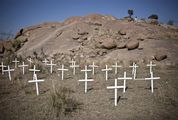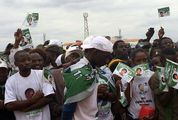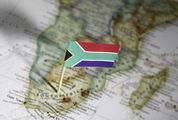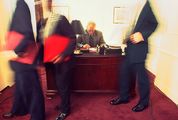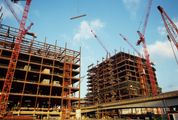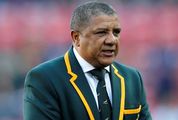South Sudan’s Machar flees to Kinshasa
by Agency Staff
2016-08-19 06:01:29.0
NAIROBI — South Sudan’s former rebel leader and former vice-president Riek Machar had escaped to the capital of the Democratic Republic of Congo (DRC) following violent clashes in July, an official said on Thursday.
"Riek Machar is currently in DRC, in Kinshasa, and wants to go as soon as possible to Ethiopia," an aide told AFP. An earlier statement from Machar’s SPLM-IO party said the leader had been "evacuated to a safe country within the region", without naming the DRC.
Civil war broke out in South Sudan in December 2013 when President Salva Kiir accused Machar, then his deputy, of plotting a coup. The fighting has split the world’s newest country along ethnic lines and driven it to the brink of collapse.
A peace deal signed between the government and rebels a year ago has so far failed to end the conflict. And in August Juba was rocked by several days of heavy fighting between Kiir’s forces and those loyal to Machar.
Machar’s whereabouts had been unclear since the fighting flared in Juba between July 8 and 11 and led to his outgunned and outnumbered forces being chased from the city by government troops.
He was subsequently replaced as vice-president on July 25 by Taban Deng Gai, a former friend and ally.
Deng warned on Wednesday that Machar should stay out of politics to allow peace, despite previously indicating that if Machar returned to Juba he would stand aside.
Machar’s intention to travel to Ethiopia, a regional power broker that hosted peace talks through the Igad trade bloc, suggests he has no intention of being cut out of negotiations or pushed from power.
READ THIS: Cooking invoices costs Africa billions
Several former rebel commanders have warned they consider Deng’s elevation to vice-president to be "treason".
Also on Wednesday, the UN launched a probe of a hotel attack in South Sudan, in which soldiers raped women and assaulted aid workers, while UN peacekeepers allegedly failed to act. The abuses now being probed by the UN — specifically, a July 11 attack on the Hotel Terrain in the capital Juba — took place during the violence that engulfed the city for four days in July.
Last Friday the UN Security Council approved a US-drafted resolution to strengthen the 12,000-person peacekeeping mission with 4,000 additional troops drawn from regional armies and equipped with a more aggressive mandate. Juba has yet to accept the resolution.
Meanwhile UN chief Ban Ki-moon has expressed disappointment over the failure of talks between the Sudanese government and rebels on a cease fire in Darfur and two other conflict zones.
The talks on a cessation of hostilities in Darfur, Blue Nile, and South Kordofan were held in Addis Ababa last week after three prominent rebel groups signed a roadmap brokered by AU mediators for ending the conflicts in the three areas.
Their signing of the roadmap, which had already been signed by the Sudanese government, had raised hopes of a breakthrough after successive rounds of abortive talks.
AFP
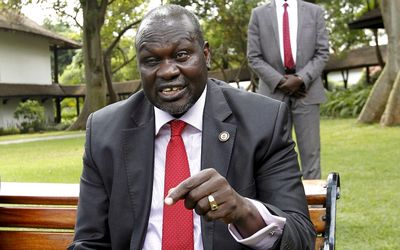
Riek Machar. Picture: REUTERS/THOMAS MUKOYA
NAIROBI — South Sudan’s former rebel leader and former vice-president Riek Machar had escaped to the capital of the Democratic Republic of Congo (DRC) following violent clashes in July, an official said on Thursday.
"Riek Machar is currently in DRC, in Kinshasa, and wants to go as soon as possible to Ethiopia," an aide told AFP. An earlier statement from Machar’s SPLM-IO party said the leader had been "evacuated to a safe country within the region", without naming the DRC.
Civil war broke out in South Sudan in December 2013 when President Salva Kiir accused Machar, then his deputy, of plotting a coup. The fighting has split the world’s newest country along ethnic lines and driven it to the brink of collapse.
A peace deal signed between the government and rebels a year ago has so far failed to end the conflict. And in August Juba was rocked by several days of heavy fighting between Kiir’s forces and those loyal to Machar.
Machar’s whereabouts had been unclear since the fighting flared in Juba between July 8 and 11 and led to his outgunned and outnumbered forces being chased from the city by government troops.
He was subsequently replaced as vice-president on July 25 by Taban Deng Gai, a former friend and ally.
Deng warned on Wednesday that Machar should stay out of politics to allow peace, despite previously indicating that if Machar returned to Juba he would stand aside.
Machar’s intention to travel to Ethiopia, a regional power broker that hosted peace talks through the Igad trade bloc, suggests he has no intention of being cut out of negotiations or pushed from power.
READ THIS: Cooking invoices costs Africa billions
Several former rebel commanders have warned they consider Deng’s elevation to vice-president to be "treason".
Also on Wednesday, the UN launched a probe of a hotel attack in South Sudan, in which soldiers raped women and assaulted aid workers, while UN peacekeepers allegedly failed to act. The abuses now being probed by the UN — specifically, a July 11 attack on the Hotel Terrain in the capital Juba — took place during the violence that engulfed the city for four days in July.
Last Friday the UN Security Council approved a US-drafted resolution to strengthen the 12,000-person peacekeeping mission with 4,000 additional troops drawn from regional armies and equipped with a more aggressive mandate. Juba has yet to accept the resolution.
Meanwhile UN chief Ban Ki-moon has expressed disappointment over the failure of talks between the Sudanese government and rebels on a cease fire in Darfur and two other conflict zones.
The talks on a cessation of hostilities in Darfur, Blue Nile, and South Kordofan were held in Addis Ababa last week after three prominent rebel groups signed a roadmap brokered by AU mediators for ending the conflicts in the three areas.
Their signing of the roadmap, which had already been signed by the Sudanese government, had raised hopes of a breakthrough after successive rounds of abortive talks.
AFP


